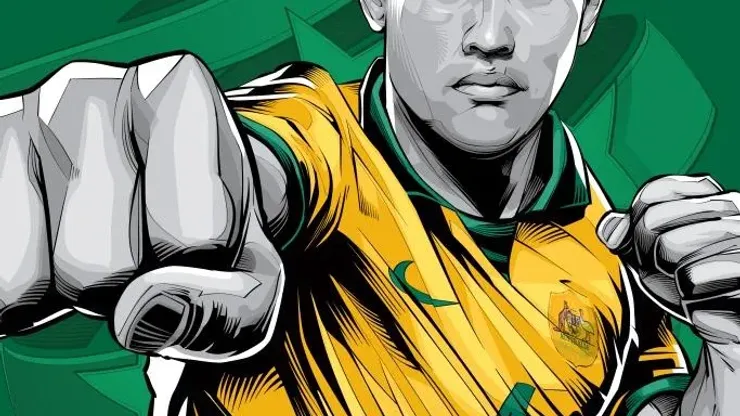The pride of a nation. Australia’s 2-3 defeat at the hands of the Netherlands was arguably their greatest result on the international stage, so much so that, for many fans, regardless of what the score line suggested, it felt like a win. And if their previous 3-1 loss at the hands of Chile wasn’t enough to persuade fans home and abroad, then yesterday’s game surely did just that.
Unforeseen and unscripted, the Socceroos proved their worth against a side that, just days ago, had dismantled an all-conquering Spain team – their gallant efforts on the pitch was just another indication that Australia weren’t just in Brazil as a decorative team, serving the mere purpose of filling up the numbers.
In fact, their exploits against a well-disciplined Dutch side proved that, contrary to popular belief, the Australians can play beautiful football. And, in what is his first World Cup, Ange Postecoglou showed why he currently is Australia’s greatest managerial export.
From the off, you could sense that something special would transpire. Unlike Australia’s nervy start against Chile, a match in which La Roja’s aggressive approach made sure that Jedinak and co. would begin right on the back-foot, drowning under intense pressure, the Socceroos took their game to the Dutch, and sought to play a brand of attacking football which evoked memories of the golden generation under Dutchman Guus Hiddink.
Postecoglou’s troops attempted to stretch the Netherlands defense, often exploiting the gaps on the wing as both wingers found themselves marauding along the flanks. The passing was exquisite, although the finishing touch not so much. Yet despite setback after setback, the Socceroos powered on, attempting to break down a stubborn back-line.
However, the difference in quality was evident. When given the chance to take the lead, Arjen Robben took the opportunity without a fuss. His goal in the 21st minute was a big blow to an inexperienced side, many of whom were only playing in their second World Cup fixture. Unlike the previous crops of players who featured heavily under the tutelages of Pim Verbeek and Holger Osieck, however, the Australians would not return to the shells, but instead looked to attack, encapsulating their typical fighting spirit.
Their exploits were finally rewarded with Tim Cahill’s Van Basten-esque volley and a Mile Jedinak penalty which, at one stage, looked as if the Socceroos would pull off a shock result.
That was not to be however, as the Dutch fought back thanks to some sluggish defending and a goalkeeping howler. On another day, however, Van Gaal may not have been so lucky.
The result, although a negative one on paper, puts the Australians in good stead in tournaments to come. Their valiant display, with their hearts on their sleeves, won over the hearts of neutrals and opposing supporters – to the point where the Oranje fans gave Tim Cahill a standing ovation as he walked off the World Cup pitch for the last time with his head held high.
Despite Cahill’s heroics, the side’s quick turnaround in form can only be attributed to one man. Unlike his more conservative predecessors who were more than happy to call upon the nation’s previous heroes, Ange Postecoglou underwent a squad regeneration in a hurry. Case in point: Sasa Ognenovski, who was expected to the side’s defensive linchpin, was given the axe. So too was former captain Lucas Neill and experienced warrior Luke Wilkshire.
His decision to field a squad filled mainly with Australia’s youngest stars was a bold move; in retrospect, a risk which paid off.
Next year, Australia play host to Asia’s biggest football competition, the Asian Cup – and based on their form, the tournament promises to be an unprecedented success.
First of all, though, they’ll need to navigate their way past the already dethroned world champions Spain. With nothing but pride to play for, expect the Socceroos to provide a stern challenge for Del Bosque’s men.
Indeed, Australia failed to qualify from the ‘Group of Death’, but what the youngsters showed was that they are able to match it with the best. It has been a World Cup that has united a nation and given it so much hope for the future. Their exploits are a reflection of football’s growing superiority in a country where rugby and cricket dominate the sporting dynamic. And for the Socceroos, a bright future for the game lies ahead.
Follow Cronan on Twitter: @Cronan_Yu
200+ Channels With Sports & News
- Starting price: $33/mo. for fubo Latino Package
- Watch Premier League, Women’s World Cup, Euro 2024 & Gold Cup
The New Home of MLS
- Price: $14.99/mo. for MLS Season Pass
- Watch every MLS game including playoffs & Leagues Cup
Many Sports & ESPN Originals
- Price: $10.99/mo. (or get ESPN+, Hulu & Disney+ for $14.99/mo.)
- Features Bundesliga, LaLiga, Championship, & FA Cup
2,000+ soccer games per year
- Price: $5.99/mo
- Features Champions League, Serie A, Europa League & Brasileirāo
175 Premier League Games & PL TV
- Starting price: $5.99/mo. for Peacock Premium
- Watch 175 exclusive EPL games per season







